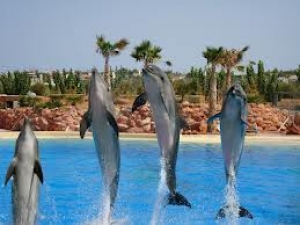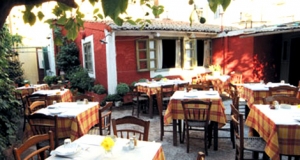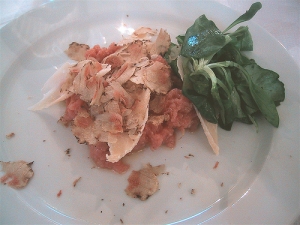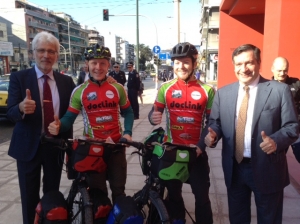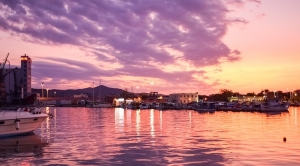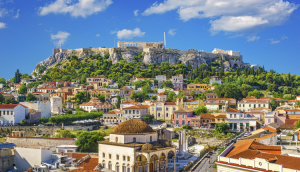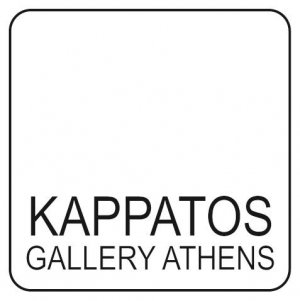XpatAthens
My Week in Athens… Sep 20
As it turns out, there is a zoo in Athens! Well, just outside Athens towards the airport - in Spata, to be precise. Maybe I'm the last to know this - it wouldn't be the first time.
The Attica Zoological Park has been growing and adding to its surprising collection of animals since 2000. With lions, cheetahs, apes, camels, rhinos, birds - the list goes on - this is a great day out for the whole family. The day we went, we were lucky to be in time for the dolphin show, where a family of dolphins happily swims and twirls about, to the utter joy of the young (and not so young) audience.
As I learned about the zoo, I found out that it is a member of ΕΑΖΑ (European Association of Zoo and Aquaria) and follows strict guidelines around animal hosting & conservation. This is great! And with tickets priced at €15.00 (adults) and ?11.00 (kids under 12), this is a well-priced day out ("worth it!")
And if the animals weren't enough of a draw for our trek out to Spata, across the road from the fantastic zoo is the equally fantastic McArthur Glen Designer Outlet. (The first one in Greece - this I had heard about.) It's got 110 shops with prices 35-70% off retail, in one of those 'village style' outdoor mall setups. Surely something for everyone's taste.
A jam-packed Saturday - and 'worth the drive to Spata'.
Attica Zoological Park
McArthur Glen Athens
Until next week.
Jack
In this weekly space, keep up with ‘Jack’ as he navigates daily life in Athens… Anecdotes, stories, hits & misses, the good, the bad and, well, the rest…
Taverna Tou Xinou
Address: 4 Angelou Geronda Street, Athens 10557, Neighborhood: Plaka
Tel: 30 210 322 1065
Opening Hours: July-May, M-F 7pm-midnight
Text by © wcities.com 2013
nileguide.com
Do you have a recommendation or recipe to share? Send it to us at ideas@xpatathens.com!
"Recycle” Your Library Through Bookukoo
Read More, Spend Less! Bookukoo is a new location-based book swap application. It lets you give the hard-copy books you don’t need and get ones you are looking for. For free! As a user you can upload and manage your personal library, i.e. a list of books you are willing to give, as well as browse other people’s libraries. Once you find a title you want, you request it by pressing the “Get it” button.
Bookukoo then puts you in contact with the book-owner through email.
Location-based: For the first time, you have the ability to specify your location on the map and let others know where your personal library is located. Bookukoo gives you the ability to search available books in certain geographical areas, for example find booklovers that live in the same neighborhood as you do.
Easy to use: Managing your library is very easy. You don’t have to type anything. When adding a book to your library you just use your camera to scan the barcode on the back of a book. Immediately all relevant information, such as title, author, and cover page is automatically retrieved. That’s as simple and error-free as it can be.
Unlimited usage: Users can perform an unlimited number of book-swaps. In other words, users can endlessly “recycle” their libraries, at no cost.
Point system: A point system is used in order to ensure fairness and guarantee that you will receive as many books as you provided to the community. You give one book, you get one book. You give 10, you get 10. The point system gives you the flexibility to move away from a book-for-book swap scheme. You can now give away a number of books, collect an equal number of tokens and redeem them later, when you receive books from other members of the bookukoo community.
Disclaimer: bookukoo is designed to work only for hard-copy books, not e-books.
To download the app, please visit bookukoo.com
It's Truffle Time At "Sale e Pepe" In Kolonaki
It's the season for white truffles and one of the best restaurants to samples these delicacies in Athens is Sale e Pepe in Kolonaki. The restaurant serves Italian food which focuses on serving seasonal specialities. The owner Ivan Ottaviani, is a big wine lover and the restaurant has one of the best wine lists in Athens with a focus on Italian wines. The service is extremely friendly however prices are on the high side (apetizers 15-20 Euros, main dish around 30Euros, cheese and desert around 20 Euros). White truffle dishes cost approximately 50 Euros.
Wonderful restaurant with a very nice view of the Acropolis (which is more subtle than Orizontes).Sale e Pepe has a tasting menu available for a minimum of 2 persons. Nice wine selection but you may be pushed to buy Grecian wine by the sommelier.
Sale e Pepe, Tel 210-7234102, address 34 Aristippou Street - Kolonaki
Review: It was a Friday afternoon and friends suggested we go out to dinner. After discussing some potential restaurant choices we decided to book at Sale e Pepe in the Kolonaki area of central Athens. An out-of-the-way Italian restaurant, housed on a narrow street on the slopes of the Lycabettus; where parking is typically a nightmare.
I knew Sale e Pepe from Mykonos: a very small but pleasant restaurant that served tasty Italian food with a slight twist. Prices were a bit steep, but being in Mykonos, over-inflated prices compared to Athens is the norm. I remembered at that moment that Sale e Pepe in Mykonos had closed down a few years back but had not learnt why.
We arrived fifteen minutes late as Athens was under a sheet of rain. Walking in, two 30-something aged women took our coats and seated us. I had the impression that the waitresses were overacting, something common in the US but not in Greece. They gave me the feeling of having had stepped out of “Interview of a Vampire”, seemingly ready to suck our blood. My worst fears were later confirmed, although I did give them the benefit of the doubt for perhaps trying to play their role in the setting of the space they were at. The restaurant was dark. The look was that of a gentrified German autobahn stop. But again, laden with cupboards full of wine on display, the stale smell possibly attributed to its all-surrounding wooden interior, I considered that perhaps I was being too harsh with my first impressions.
So now we were seated. Having heard us conversing in English, they offered us an English menu. A thoughtful touch. We held onto both the Greek and English menus. We like to compare for fun. A 100-page wine “Encyclopaedia” was handed to us, to complement the culinary adventure we were unknowingly about to embark on. The extensive list included wines from Spain, France, Italy, Greece… Lebanon - all with a very expensive price tag. I immediately felt awkward. I was the one who had to choose. I then understood the restaurant’s focus is wine, as a way of complementing the rich Northern Italian tastes it offers. Having narrowed down to a short list, we went down the safe path of ordering a Brunelo from Tuscany, at 60 euro a bottle. It made us reminisce back on a pleasant road-trip a few years ago in the like-named Italian province. The waitress couldn’t help herself from remarking that one of our three pre-selected wines would be better revisited in a few years… at that time I knew we were in trouble! I could also not help at that point but have felt a little uneasy and frankly a little irritated at having been ‘told off’ for not being quite the connoisseur she so clearly wanted us to know she was.
The menu was not so complicated in presentation as much as in content… Loads of venison, wild duck, quail eggs, cod (written cold in the English menu), accompanied by pasta and fruity tastes. My stomach started making strange noises. We were all puzzled with the combinations so it took us a good long while to select the most appropriate dish to each of us. I finally ordered the risotto with Tuscan sausage and leeks. Whilst I liked that the restaurant offered more eclectic Italian tastes unlike the classic pizza, spaghetti, mozzarella, the prices on the menu were frightful.
The final couple we were waiting to join us was late. We were hungry and asked for some bread to fill in time. Our waitress took that opportunity to jump on us by rather assertively suggesting a cheese platter. A two minute explanation followed. We had the four types of aged cheeses explained to us. There was also a plate with finely carved and truly very tasty St. Danielle prosciutto on the menu which we asked for. It was served with two poached eggs and black truffle shavings. Both plates were rich tasting enough to avert us from choosing any additional starters.
As the main courses arrived, the plates were small portioned, as should be for a four course menu, but substantial in taste.
One of us ordered a starter salad as a main course. The menu read “cuttlefish and langoustine salad with crispy vegetables”. We asked what crispy vegetables meant and were told that they were lightly sautéed and then corrected to them being marinated. In fact they consisted of one tuft of plain boiled broccoli, one of cauliflower and half a carrot. The single langoustine turned out to be a shrimp – not even king prawn – again plainly boiled and unseasoned, and the cuttlefish was mediocre in that the olive oil it was covered in was truly tasty.
The gentleman across from me ordered venison with parpardele. Half way through the meal, his eyes rolled as he gasped that the dish was too rich for him. I had a taste and instantly flashed back to a road-kill story in New England. The venison stank!
In all honesty my risotto was ok, cooked properly al-dente, but at around 30 euros a serving I expected something even slightly more sophisticated. The remaining dishes I would say were all simply decent, without much to rave about.
I was tired and getting a little restless with the whole experience, knowing that I wouldn’t be able to sleep well in the next few hours. My stomach had already started to feel like the financial market - in crisis.
As some wanted to end the night on a sweet note, we ordered desserts: a sweet crepe with cheese and a tarte tatin. Our waitress, in her classic mode, also pushed an assortment of three chocolate desserts on us. They were all pleasant in appearance but dissatisfying in taste. The crepe was squishy, the tarte was soggy. Of the three chocolate dishes, the chocolate soufflé was overcooked and reminded me of my puppy’s excrement I recently scooped up, the chocolate pyramid covered in granules of rock salt was just plainly bizarre and the chocolate cube with orange syrup was simply boring.
And finally time to pay! Our waitress was happy to remark that the Lemoncelo shots were on the house! At 110 euro per person (around $150)… I wondered what this restaurant’s strategy was: considering that we are in time of financial crisis, the restaurant was 10% full on a Friday night and prices where totally off compared to the tastes provided.
Overall I would recommend this restaurant to wine lovers alone who might wish to accompany their selection with a cheese or meat platter. Beware and be prepared when venturing down to main course and please make sure you eat early and you arrive on a very! empty stomach.
www.stafida.gr
Bikers Ride From Athens To Kassel With Documenta 14 To Send Message Of Solidarity
Autumn Holidays In Greece
Christmas And New Year's In Athens - 220 Events In 34 Days
Top 10 Reasons To Love Living In Greece in 2019
- The buskers along Dionysiou Aeropagetou. The pedestrian zone near where I live is filled with street performers so it becomes like a progressive concert most days as I walk my dog Andromeda. I never know who will be there or what to expect-we have bubble blowers, musicians, an African bongo group, silk performers and dance troupes, just to name a few. There is even a woman who will put your hair in a stylish braid or updo for 5 euros. It’s on my list to try in 2019…
- Beach Volleyball. Last spring I decided to learn beach volleyball. I wanted to be trained by professionals so I asked my friend Sakis Psarras where to go, and he directed me to the Attica Beachvolley Club. I love my lessons–we practice outside in the fresh air, barefoot in the sand. My teammates and coaches are so encouraging (bravo Lynn!) that in the beginning I got confused and thought I had real talent. But then one day, when I hit the ball right and the entire team clapped, I realized, no. It’s the opposite. I’m really bad, and they are trying to keep my spirits up…It’s ok, I wasn’t planning to go pro. But one day, I would like to play in a beginners tournament.
- The Athens Riviera. This year I discovered the Athens Riviera and the beaches south of Athens in Glyfada, Voula and Vouliagmeni. I didn’t realize seaside near Athens could be so good. Lots of them are blue flag beaches and on par with many islands…The water is clean, the beach clubs are fun, and best of all, we have SUP Yoga at Astir Beach with one of the best sunsets in town.
- Things get cheaper. The longer I live in Greece, the cheaper things seem to become. All around Athens, I now get discounts–discounts because I’m a yoga teacher, discounts because I live in the neighborhood, discounts because I’ve been coming a long time, discounts for reasons I can’t even identify, but I hear it often -μια άλλη τιμή για σένα! (another price for you!). This was not the case in San Francisco. It must be a Greek thing…
- Athens is becoming a health food mecca! When I moved to Athens in 2012, if I asked for “quinoa” and “nutritional yeast” I got blank stares. Now I get quinoa in the regular supermarket, and I choose between two brands of nutritional yeast in my favorite bio store. I can eat at Vegan Beat, Vegan Nation, Avocado and Nice and Easy—all an easy walk from my apartment. This was also the year I discovered Yi, the super healthy vegetarian raw food restaurant in Glyfada. If I could create a restaurant, it would be Yi. Everything is sugar-free and gluten-free, and the restaurant allows dogs. For me, it is a small paradise.
- My new doctor. My new doctor, Nikoleta Koini, is one of the few US-trained functional medicine doctors in Greece. Functional medicine is science based, 100% individualized, holistic preventative medicine. It matches my medical philosophy almost perfectly so I was thrilled to find a highly trained functional medicine doctor in Athens. Now I have supplements that are precisely matched to my situation. It might take some research, but you can get great medical care in Greece.
- Filotimo is part of the culture. The word “filotimo” exists only in Greek, and it means doing the right thing without expecting anything in return. I’ve seen it acted out time and time again.
There was the time my taxi driver Dimos came to pick me and my friends up in his personal car on a taxi strike day. He took us to the port but refused to accept money (ever) for the journey, because he wanted to respect the rules of the strike but also wanted us to have our holiday.
There was the time when I got sick in a mountain village on a weekend trip. All pharmacies were closed, but the souvenir store owner gave me his full package of Panadol. He was worried about me and wasn’t sure when I’d be able to get to an open pharmacy. He didn’t accept my offer to pay him, and in fact, he seemed confused when I tried to give him money.
There was the time I was out with my friends late at night on a Greek island holiday. The taxis had all stopped, and we were eight kilometers from our hotel stranded without a clear way to get home. One of my friends approached a group of men sitting at a café and within minutes, one of them was driving us to our hotel. This time I knew better than to offer money, and my friends confirmed, yes, he would have been horrified if we tried to pay him.
I could go on and on, but you’ll see for yourself. Even people here for short visits usually experience filotimo in one way or another. - Greece ignites your creativity. I think it was Lord Byron who said “If I am a poet, the air in Greece has made me one.” I would say the same—if I am a writer, living in Greece has made me one. I’ve written two books since coming to Greece and before living here, I was an accountant who never planned to write anything. It is hard to describe, but there is something in the air or energy that sparks your creativity. And it feels so nice.
- The olive culture. It seems everyone in Greece is within three degrees of separation from an olive grove—their parents have one, their uncle has one, their best friend has one. The thread of olives runs all throughout the country as part of the social fabric. I’ve even been scolded for buying olive oil—it is usually gifted around. I should also mention the variety. I used to think that Greek olives meant Kalamata olives. Not so. There are dozens of varieties, in all shapes, sizes and colors. I have included a picture for you here. Olive oil is even used in baptisms—which leads me to my final favorite thing.
- I am a Greek Nona! I have saved the best for last. This year I became the Nona (godmother) to my friend Maria’s daughter. The godmother’s role is to be a spiritual advisor, and apparently she bestows some of her traits to her godchild. I’m not sure about how that works, but if I get to choose any traits, I’ll give Alexia the gifts of resilience and joy. If she has those two, I think she’ll have a good chance for a happy life. And as part of this process, I’m getting baptized Greek Orthodox myself this Easter. The transformation is almost complete. Θα είμαι Ελληνίδα.
Lynn is an American Kundalini yoga and Enneagram instructor teaching a unique combination of the two systems, combining the physical benefits of Kundalini yoga with the psychological growth tools of the Enneagram.
Kappatos Gallery
The gallery aims to introduce to the Greek public acclaimed international artists such as: Marina Abramovic, Lynda Benglis, Louise Bourgeois, Phil Collins, Martin Creed, Nasos Daphnis, Jan Dibbets, Rebecca Horn, Roni Horn, William Kentridge, Kai Schiemenz, Santiago Sierra, Penny Siopis, Theodoros Stamos.
Furthermore, Kappatos gallery is committed to the promotion of emerging artists. The gallery organises and curates the historic annual exhibition, entitled “Rooms,” in collaboration with established curators and art-historians, that aims to present talented emerging artists that haven’t yet presented their work at solo exhibitions.
The gallery is located at the historic centre of Athens (560m² venue) and has launched the first official Art Residency supported by a European fund (NFRS) and the programme Publicscapes: Art and Curatorial Practice in the Public Sphere. The residency aims to promote international exchange of practice and knowledge in the arts (visual and sound art, architecture, performance) and to investigate points of intersection between the arts and the public sphere by means of public interventions and educational programmes.
PAMEMMAZI
PAMEMMAZI is a newly established Non-Profit Organization that aims to improve the psychosocial health of cancer patients in Greece and to promote the holistic approach of cancer.
What we do:
- We provide meaningful, creative and educational activities to cancer patients and their caretakers in welcoming and cozy spaces in Greek hospitals
- We organize forums and events to promote psychosocial and psychosomatic care of cancer patients in Greece - 2017 Forum: Psychosomatic care in Cancer: Empathy, Understanding and Communication
- We encourage patients and survivors to share their story on Scars & Scarves blog in order to destigmatize cancer
- We provide tips on side effects’ management, nutrition, physical activity and personal care
- We participate in the annual Greece Race for the Cure Marathon organized by Alma Zois, under the Untouchables team that Emma created in 2014
- Empower patients, their families and their caretakers through creative and educational offered in hospitals
- Build a community that will foster resilience, quality of life and normality using creativity and learning as tools
- Eliminate stigma toward and encourage community support for patients
- Raise funds for research purposes to help cure cancer
-
Make hospital visits and stays more constructive, fun and less unpleasant
-
Encourage patients and caretakers to engage in creative activities and therefore to express their feelings through them
-
Strengthen their sense of productivity/staying active and creative
-
Create welcoming spaces in hospital facilities fostering the development of a community that encourages patients to share their story and to lead a normal life
- Eliminate social stigma towards cancerShape patient-centered healthcare.
XpatAthens Is Proud To Be A Non-Profit Sponsor To PAMEMMAZI

